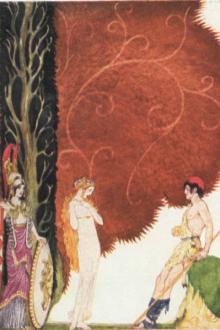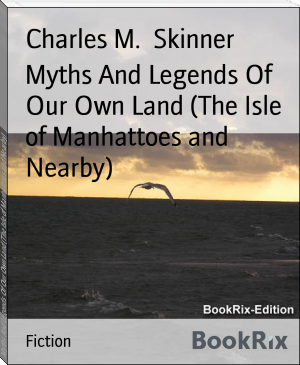The Adventures of Odysseus and The Tales of Troy - Padraic Colum (i read books .txt) 📗

- Author: Padraic Colum
- Performer: -
Book online «The Adventures of Odysseus and The Tales of Troy - Padraic Colum (i read books .txt) 📗». Author Padraic Colum
'So he spoke and departed and King Priam went within the hut. There great Achilles was sitting and King Priam went to him and knelt before him and clasped the hands of the man who had slain his son. And Achilles wondered when he saw him there, for he did not know how one could have come to his hut and entered it without being seen. He knew then that it was one of the gods who had guided this man. Priam spoke to him and said, "Bethink thee, Achilles upon thine own father. He is now of an age with me, and perhaps even now, in thy far-away country, there are those who make him suffer pain and misery. But however great the pain and misery he may suffer he is happy compared to me, for he knows that thou, his son, art still alive. But I no longer have him who was the best of my sons. Now for thy father's sake have I come to thee, Achilles, to ask for the body of Hector, my son. I am more pitiable than thy father or than any man, for I have come through dangers to take in my hands the hands that slew my son."'
'Achilles remembered his father and felt sorrow for the old man who knelt before him. He took King Priam by the hand and raised him up and seated him on the bench beside him. And he wept, remembering old Peleus, his father.'
'He called his handmaids and he bade them take the body of Hector and wash it and wrap it in two of the robes that Priam had brought. When they had done all this he took up the body of Hector and laid it himself upon the wagon.'
'Then he came and said to King Priam, "Thy son is laid upon a bier, and at the break of day thou mayst bring him back to the City. But now eat and rest here for this night."'
'King Priam ate, and he looked at Achilles and he saw how great and how goodly he was. And Achilles looked at Priam and he saw how noble and how kingly he looked. And this was the first time that Achilles and Priam the King of Troy really saw each other.'
'When they gazed on each other King Priam said, "When thou goest to lie down, lord Achilles, permit me to lie down also. Not once have my eyelids closed in sleep since my son Hector lost his life. And now I have tasted bread and meat and wine for the first time since, and I could sleep."'
'Achilles ordered that a bed be made in the portico for King Priam and his henchman, but before they went Achilles said: "Tell me, King, and tell me truly, for how many days dost thou desire to make a funeral for Hector? For so many days space I will keep back the battle from the City so that thou mayst make the funeral in peace." "For nine days we would watch beside Hector's body and lament for him; on the tenth day we would have the funeral; on the eleventh day we would make the barrow over him, and on the twelfth day we would fight," King Priam said. "Even for twelve days I will hold the battle back from the City," said Achilles.'
'Then Priam and his henchman went to rest. But in the middle of the night the young man who had guided him to the hut of Achilles—the god Hermes he was—appeared before his bed and bade him arise and go to the wagon and yoke the mules and drive back to the City with the body of Hector. Priam aroused his henchman and they went out and yoked the mules and mounted the wagon, and with Hermes to guide them they drove back to the City.'
'And Achilles on his bed thought of his own fate—how he too would die in battle, and how for him there would be no father to make lament. But he would be laid where he had asked his friends to lay him—beside Patroklos—and over them both the Greeks would raise a barrow that would be wondered at in after times.'
'So Achilles thought. And afterwards the arrow fired by Paris struck him as he fought before the gate of the City, and he was slain even on the place where he slew Hector. But the Greeks carried off his body and his armour and brought them back to the ships. And Achilles was lamented over, though not by old Peleus, his father. From the depths of the sea came Thetis, his goddess-mother, and with her came the Maidens of the Sea. They covered the body of Achilles with wonderful raiment and over it they lamented for seventeen days and seventeen nights. On the eighteenth day he was laid in the grave beside Patroklos, his dear friend, and over them both the Greeks raised a barrow that was wondered at in the after-times.'
XXIow Hector's sister was the first to see her father coming in the dawn across the plain of Troy with the wagon upon which his body was laid. She came down to the City and she cried through the streets, "O men and women of Troy, ye who often went to the gates to meet Hector coming back with victory, come now to the gates to receive Hector dead."'
'Then every man and woman in the City took themselves outside the gate. And they brought in the wagon upon which Hector was laid, and all day from the early dawn to the going down of the sun they wailed for him who had been the guardian of their city.'
'His father took the body to the house where Hector had lived and he laid it upon his bed. Then Hector's wife, Andromache, went to the bed and cried over the body. "Husband," she cried, "thou art gone from life, and thou hast left me a widow in thy house. Our child is yet little, and he shall not grow to manhood in the halls that were thine, for long before that the City will be taken and destroyed. Ah, how can it stand, when thou, who wert its best guardian, hast perished? The folk lament thee, Hector; but for me and for thy little son, doomed to grow up amongst strangers and men unfriendly to him, the pain for thy death will ever abide."'
'And Hekabe, Hector's mother, went to the bed and cried "Of all my children thou, Hector, wert the dearest. Thou wert slain because it was not thy way to play the coward; ever wert thou championing the men and women of Troy without thought of taking shelter or flight. And for that thou wert slain, my son."'
'And I, Helen, went to the bed too, to lament for noble Hector. "Of all the friends I had in Troy, thou wert the dearest, Hector," I cried. "Never did I hear one harsh word from thee to me who brought wars and troubles to thy City. In every way thou wert as a brother to me. Therefore I bewail thee with pain at my heart, for in all Troy there is no one now who is friendly to me."'
'Then did the King and the folk of the City prepare for Hector's funeral. On the tenth day, weeping most bitter tears they bore brave Hector away. And they made a grave for him, and over the grave they put close-set stones, and over it all they raised a great barrow. On the eleventh day they feasted at King Priam's house, and on the twelfth day the battle began anew.'
XXIIor many days Telemachus and his comrade Peisistratus stayed in the house of King Menelaus. On the evening before he departed Menelaus spoke to him of the famous deeds of his father, Odysseus. 'Now Achilles was dead,' said Menelaus, 'and his glorious armour was offered as a prize for the warrior whom the Greeks thought the most of. Two men strove for the prize—Odysseus and his friend Aias. To Odysseus the armour of Achilles was given, but he was in no way glad of the prize, for his getting it had wounded the proud spirit of great Aias.'
'It was fitting that Odysseus should have been given Achilles' armour, for no warrior in the host had done better than he. But Odysseus was to do still greater things for us. He knew that only one man could wield a bow better than Paris,—Paris who had shot with an arrow Achilles, and who after that had slain many of our chiefs. That man was Philoctetes. He had come with Agamemnon's host to Troy. But Philoctetes had been bitten by a water-snake, and the wound given him was so terrible that none of our warriors could bear to be near him. He was left on the Island of Lemnos and the host lost memory of him. But Odysseus remembered, and he took ship to Lemnos and brought Philoctetes back. With his great bow and with the arrows of Hercules that were his, Philoctetes shot at Paris upon the wall of Troy and slew him with an arrow.'
'And then Odysseus devised the means by which we took Priam's city at last. He made us build a great Wooden Horse. We built it and left it upon the plain of Troy and the Trojans wondered at it greatly. And Odysseus had counselled us to bring our ships down to the water and to burn our stores and make it seem in every way that we were going to depart from Troy in weariness. This we did, and the Trojans saw the great host sail away from before their City. But they did not know that a company of the best of our warriors was within the hollow of the Wooden Horse, nor did they know that we had left a spy behind to make a signal for our return.'
'The Trojans wondered why the great Wooden Horse had been left behind. And there were some who considered that it had been left there as an offering to the goddess, Pallas Athene, and they thought it should be brought within the city. Others were wiser and would have left the Wooden Horse alone. But those who considered that it should be brought within prevailed; and, as the Horse was too great to bring through the gate, they flung down part of the wall that they might bring it through. The Wooden Horse was brought within the walls and left upon the streets of the city and the darkness of the night fell.'
'Now Helen, my wife, came down to where the Wooden Horse was, and she, suspecting there were armed men within, walked around it three times, calling to every captain of the Greeks who might be within in his own wife's voice. And when the sound of a voice that had not been heard for so many years came to him each of the captains started up to answer. But Odysseus put his hands across the mouth of each and so prevented them from being discovered.'
'We had left a spy hidden between the beach and the city. Now when the Wooden Horse had been brought within the walls and night had fallen, the spy lighted a great fire that was signal to the ships that





Comments (0)